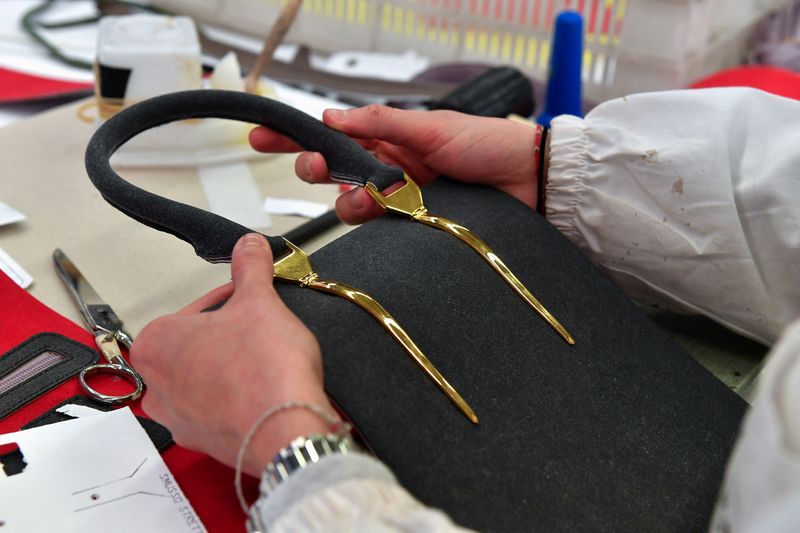By Silvia Ognibene, Elisa Anzolin and Valentina Za
FLORENCE, Italy (Reuters) - Waning Chinese demand for luxury goods has compounded the problems of Tuscany's traditional leather companies as the big fashion houses they supply reshape their strategies, leading to painful layoffs that could be just the start.
Kering (LON:0IIH)'s warning of a 40-45% drop in first half operating profit on Tuesday, as its Gucci brand suffers particularly in Asia, has called time on a post-pandemic surge in demand for designer bags and shoes.
LVMH (EPA:LVMH), the world's largest luxury group, last week reported Asia revenues fell 6% in the first quarter.
Many of the biggest luxury groups, which like Gucci base their leather goods production in Tuscany, had increased orders to respond to the post-pandemic boom. The subsequent slowdown has left warehouses full and suppliers sidelined.
Marco Carraresi, who runs the Yobel leather goods company and employs around 60 people making handbags and wallets, has felt the full force.
"We were very exposed, 50% of our capacity was taken up with work for a big Italian brand that cancelled its orders as of last September," he told Reuters.
"From early February, half of our workers have been temporarily laid off. We tried everything we could to avoid this," added Carraresi, whose company is based in Figline Valdarno, close to Florence.
CENTURIES OF SKILL UNDER EXISTENTIAL THREAT
Tuscany has been a centre for leather goods production for centuries, developing a reputation for skilled craftsmanship that helps luxury brands to command premium prices.
More than a short-term blip, locals say this downturn reflects fundamental changes in the way big brands operate.
"The subcontracting chain used to go down to a fourth and even fifth level, but in the last four of five years it has been greatly shortened, and today the brands accept a maximum of two levels of subcontracting," said Simone Balducci, who represents Florence's leather goods manufacturers with the CNA trade association.
"After COVID, production doubled, but the market did not absorb it: now the warehouses are full....In the meantime, brands have acquired numerous suppliers and taken employees in house," he added.
The figures back him up.
Last year, 428 small Tuscan leather goods producers furloughed 4,531 workers. In January alone, another 112 companies temporarily laid off 1,373 workers, official data showed.
As the six-month furlough schemes expire, producers face an existential threat, with brands relying less on outside suppliers as they produce fewer and more exclusive items.
A 3%-4% growth in global sales of leather goods in 2023 was driven solely by higher prices, while volumes shrank for the first time in a decade, a study by Bain-Altagamma showed, pointing to "heightened demand for ... more exclusive investment pieces".
Many of the businesses impacted are small and with thin profit margins. They do not have the capacity to weather sudden changes in volumes, or sustain the investments that would allow them to adjust to new consumer trends.
"Manufacturers' margins have declined particularly in recent years, partly as a result of increasing internalisation by brands," said Flavio Sciuccati, senior partner at consultancy The European House - Ambrosetti Group.
Production costs are much higher when brands manufacture in-house.
"Brands tend to keep in-house everything that has more added value, such as the design and product development, and to outsource the parts with less added value," Sciuccati added.
When relying on external manufacturers, production costs typically total just 10%-15% of a luxury handbag's retail price and only a portion of those costs is the compensation received by third-party producers, industry sources say.
BEYOND THE BIG BRANDS
Some specialist suppliers have turned their back on the big fashion houses to focus on producing limited edition products for niche markets.
Sapaf Atelier, founded 70 years ago and based among the many leather suppliers in the Florence suburb of Scandicci, has benefited from making such a break a decade ago.
"We are small, we are independent, we are a family business, and we don't work for brands, but for small emerging labels," owner Andrea Calistri said.
"The target customer is the one who wants to be the only one to own that particular bag in a big city, for example," he added, saying his workshop had hired three staff this year to take its total to 22.
Adapting to a rising trend for sustainable fashion, they are also working on a bag made from cacti, with pure gold trim for a small U.S. brand - price to end customer $20,000.
By contrast, the suppliers still reliant on the big brands are struggling to implement the transformations necessary to respond to growing consumer sensitivity to social and environmental issues.
At the same time, the big fashion houses are seeking to protect themselves.
Highlighting the risks they face in relation to their suppliers, a Milan court in April appointed an administrator to run a Giorgio Armani company following allegations it indirectly outsourced production to local Chinese-owned firms accused of exploiting workers.
Armani Group said in a statement it had "always had control and prevention measures in place to minimise abuses in the supply chain," adding it would work with the authorities to clarify its position.

In this climate, the fear in Tuscany is the permanent loss of some of the unique skills that define the "Made in Italy" appeal.
"If special measures are not taken, in the best case, these workshops will make people redundant, and in the worst-case scenario they will close down," said Paolo Brogi, Tuscan regional president for leather goods for CNA.